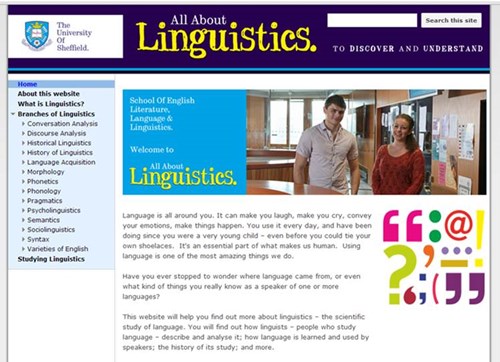Group Size
?
1.) Small group (teams of 4-6)
2.) Individual Task
3.) Large Group
4.) Any
Small group (teams of 4-6)
Learning Environment
?
1.) Lecture Theatre
2.) Presentation Space
3.) Carousel Tables (small working group)
4.) Any
5.) Outside
6.) Special
Special
QAA Enterprise Theme(s)
?
1.) Creativity and Innovation
2.) Opportunity recognition, creation and evaluation
3.) Decision making supported by critical analysis and judgement
4.) Implementation of ideas through leadership and management
5.) Reflection and Action
6.) Interpersonal Skills
7.) Communication and Strategy
1Creativity and Innovation
2Opportunity recognition‚ creation and evaluation
6Interpersonal Skills
The website www.allaboutlinguistics.com has two aims:
The website www.allaboutlinguistics.com is built as an assessment by first year students in the School of English at the University of Sheffield as part of core module entitled 'Introduction to Linguistics'.
There isn't an A-Level in Linguistics available in the UK. This means that when students apply to study linguistics, Universities rely on their personalstatements to indicate an interest in linguistics and an understanding of what studying it will involve. AllAboutLinguistics.com aims to enthuse studentsabout linguistics and the possibility of studying it at degree level, through our students sharing the insight that they have gained as beginning linguistics students themselves.

The development of this website is enterprising in many ways. The students have to ensure it met the many needs of its target audience (or 'customer'); they have to consider the appearance, identity and 'brand' of the site as well as its content.
In 2012 the site was recognised as Overall Winner in a Google / Association for Learning Technology competition for innovative uses of Google Apps in Education.
Through building the site, students have deepened their understanding of linguistics whilst also gaining valuable transferrable skills in project management, team working, use of web-based systems, and communication and collaboration tools. They have gone on to use these skills in other areas of their learning, and beyond in extracurricular work and employment.
The examples of curriculum development for enterprise related outcomes were originally outlined by Neil Coles at the International Enterprise Educators Conference under the heading 'From Archaeology to Zoology; an A-Z of enterprise in the curriculum'. For his work in contextualising enterprise for any subject, Neil won the 2013 National Enterprise Educator Award.
Access to and understanding of Google Sites, or an equivalent platform.
With thanks to Mr Gary Wood, School of English, The University of Sheffield g.c.wood@sheffield.a.cuk